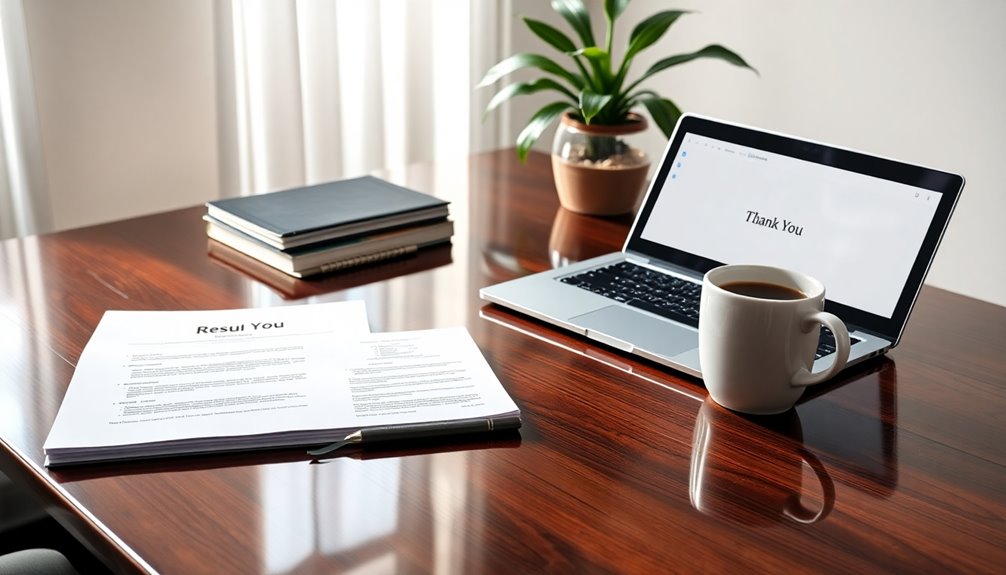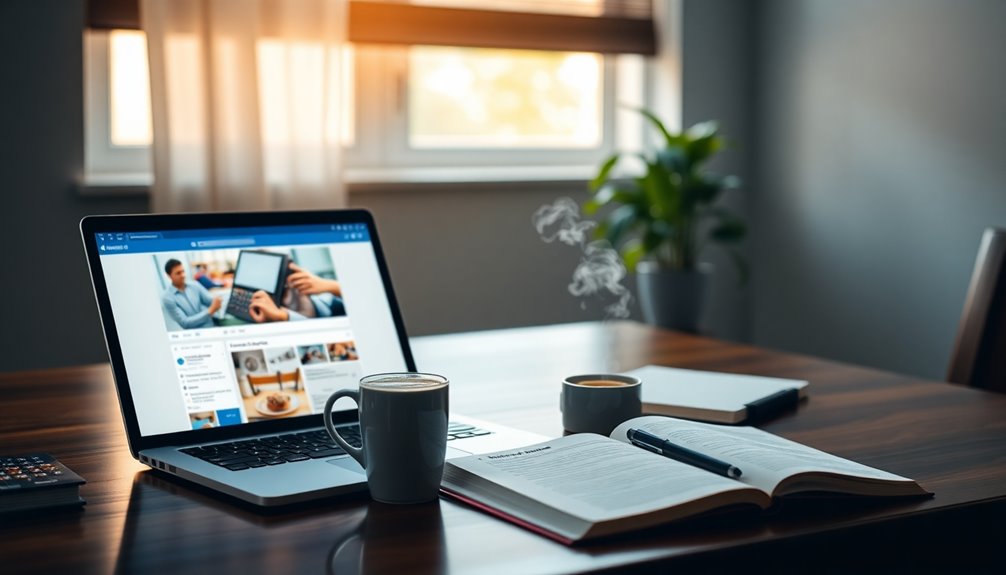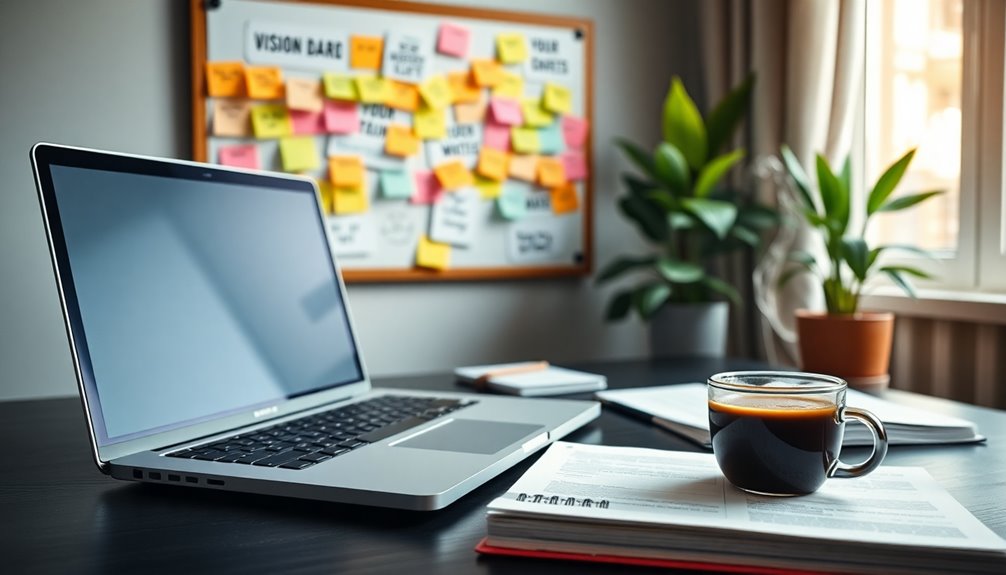Mastering post-interview success strategies can really set you apart from other candidates. Start by sending a thank-you note within 1-2 days, mentioning specific interview points to show attentiveness. Follow up with a succinct email 24 hours later to reiterate your interest. Networking is key—connect with interviewers on LinkedIn and express gratitude to any referrals. Self-reflection helps too; jot down your interview questions and assess your performance. Maintaining professionalism throughout all communications is essential. Keep these strategies in mind, and you'll strengthen your candidacy while setting the stage for future opportunities. There's more to explore that can help you excel!
Key Takeaways
- Send a personalized thank-you note within 1-2 days to express gratitude and reiterate your interest in the position.
- Follow up with a concise email 24 hours post-interview to highlight your qualifications and enthusiasm for the role.
- Maintain professional communication etiquette by using a respectful tone and clear subject lines in all follow-up messages.
- Network with company contacts by sharing your interview experience and engaging with their posts on LinkedIn to build lasting relationships.
- Reflect on your interview performance by noting questions and responses to identify strengths and areas for improvement for future interviews.
Importance of Post-Interview Actions

Post-interview actions, like thank-you notes and follow-ups, play an essential role in reinforcing your professionalism and enthusiasm for the position.
Sending a thank-you note within 1-2 days shows your gratitude and keeps your name fresh in the interviewer's mind. Reference specific points from your conversation to demonstrate attentiveness and reaffirm your interest in the role.
These actions not only highlight your keenness but can also influence decision-making, positioning you favorably against other candidates. It's an opportunity for further self-promotion, so take advantage of it.
Timing and Communication Strategies

While it's essential to express your gratitude and enthusiasm after an interview, timing and communication strategies can make a significant difference in how your message is received. You should send a thank-you note within 1-2 days to reinforce your interest. Follow up with a concise email one week later, reflecting on your qualifications. Always maintain professionalism to avoid appearing desperate.
| Action | Timing | Key Points |
|---|---|---|
| Thank You Note | 1-2 days post-interview | Express gratitude, mention specifics |
| First Follow-Up Email | 24 hours post-interview | Reiterate interest, include position |
| Second Follow-Up Email | 1 week post-interview | Highlight standout qualifications |
| Excessive Follow-Up | Avoid | Maintain professionalism |
| Subject Line Clarity | Always | Use clear, relevant subject lines |
Networking With Company Contacts

After the interview, leveraging the connections you've made can greatly enhance your chances of standing out.
Reach out to those who referred you to the role or anyone you interacted with during the process. Share your appreciation for their support and update them on your interview experience.
Connecting with interviewers on LinkedIn is also beneficial; engage with their posts to stay on their radar. Building these relationships not only keeps you in mind for this position but can open doors for future opportunities.
Don't hesitate to seek advice or insights from your new contacts, as their perspectives can be invaluable as you navigate your career.
Self-Reflection Techniques

Building on the connections you've made, reflecting on your interview performance can provide valuable insights for future opportunities.
Take some time to jot down the questions you faced and your responses. If you felt nervous or made mistakes, acknowledge them honestly and think about how you can improve next time.
Highlight the skills and experiences you shared, reinforcing your enthusiasm for the role. Consider how you presented yourself and if there were areas where you could've showcased your strengths more effectively.
This self-reflection will help you build confidence and prepare for future interviews. Remember, each experience is a chance to grow, so use these insights to refine your approach and enhance your overall performance moving forward. Additionally, implementing actionable tips from your reflections can significantly bolster your interview readiness.
Professional Communication Etiquette

Effective communication is essential in the post-interview phase, as it shapes how you're perceived by the hiring manager. Always maintain a professional tone and respect their timeline. Personalized follow-up messages keep your candidacy memorable without overwhelming them. Consider sending a handwritten thank-you note if the industry calls for it. Additionally, seek professional help if you encounter emotional challenges during the job search process, as these can impact your communication and overall confidence.
Here's a quick reference table for effective communication etiquette:
| Action | Timing | Tip |
|---|---|---|
| Send a thank-you note | Within 1-2 days | Reference specific points |
| First follow-up email | Within 24 hours | Keep it concise and relevant |
| Second follow-up | After one week | Include interview details |
| Maintain professionalism | Throughout all contact | Avoid sounding desperate |
Leveraging Social Media

Utilize social media to enhance your networking efforts and stay visible to potential employers. Connect with your interviewers and other company representatives on platforms like LinkedIn. This not only shows your interest but also keeps you in their sights.
Share relevant industry content and engage with the company's posts to demonstrate your enthusiasm and knowledge. Research the company culture through their social media channels to tailor your interactions.
Regularly update your own profiles to reflect your skills and accomplishments, ensuring they align with your job aspirations. By actively participating in discussions and networking online, you can strengthen your professional relationships and keep your name fresh in hiring managers' minds.
This proactive approach can set you apart from other candidates. Furthermore, maintaining emotional alignment during this process can enhance your confidence and overall presence in the job market.
Sending Additional Supporting Materials

After establishing connections through social media, it's important to follow up with any additional supporting materials that might strengthen your candidacy. This could include references, work samples, or relevant articles. Sending these documents promptly shows your professionalism and enthusiasm for the role.
Here's a helpful checklist for sending additional materials:
| Document Type | Purpose | Tips |
|---|---|---|
| References | Validate your experience | Choose relevant contacts |
| Work Samples | Showcase skills | Tailor to the job |
| Articles/Links | Demonstrate industry knowledge | Verify relevance |
| Assessments/Tests | Highlight abilities | Submit as requested |
| Thank You Note | Reinforce interest | Personalize it |
Frequently Asked Questions
What Should I Include in a Thank You Note?
In your thank you note, you should express genuine gratitude for the interview opportunity.
Reference specific topics you discussed to show your attentiveness and engagement.
Reiterate your excitement for the role and how your skills align with the company's needs.
Keep it concise and professional, and consider adding a personal touch, like a compliment about the company's culture or mission.
Sending it within 1-2 days demonstrates your enthusiasm and professionalism.
How Do I Handle Job Offer Negotiations?
When handling job offer negotiations, start by researching salary ranges and benefits for the position.
Clearly articulate your value and what you bring to the table. Be confident yet respectful in your communication.
If the offer doesn't meet your expectations, express your gratitude and counter with a specific figure or benefit.
Don't rush—take time to evaluate the entire package before responding.
Always maintain a positive and professional demeanor throughout the process.
When Is It Appropriate to Ask About Salary?
It's appropriate to ask about salary during the interview process, typically after you've demonstrated your value and fit for the role.
Wait for the employer to bring it up or when they ask if you have questions.
If they don't mention it by the final stages, you can inquire about salary expectations.
Just guarantee you approach the topic respectfully, focusing on your skills and how they align with the company's needs.
Should I Follow up After Receiving a Job Offer?
Yes, you should follow up after receiving a job offer. It shows your professionalism and enthusiasm for the role.
Reach out to express your gratitude and ask any clarifying questions you might've about the offer. If you need time to reflect on the offer, communicate that clearly.
This follow-up keeps the lines of communication open and reinforces your interest, making a positive impression on your future employer.
How Can I Improve My Interview Skills for Next Time?
Imagine each interview as a dance; the more you practice, the smoother your steps become.
To improve your interview skills, reflect on past performances. Record your answers and identify areas for growth. Seek feedback from peers or mentors, and rehearse common questions.
Simulate interviews to build confidence. Research the company culture deeply, so you can align your responses.
With every practice session, you'll refine your rhythm and shine brighter in future dances.
Conclusion
In the competitive job market, your post-interview actions are the seeds you plant for future success. By following these strategies, you not only keep your name fresh in the interviewer's mind, but you also demonstrate your commitment and professionalism. Think of your efforts as a bridge connecting you to your dream job—each thoughtful gesture helps you cross to the other side. Embrace these techniques, and watch as your chances of landing that role blossom into reality.









